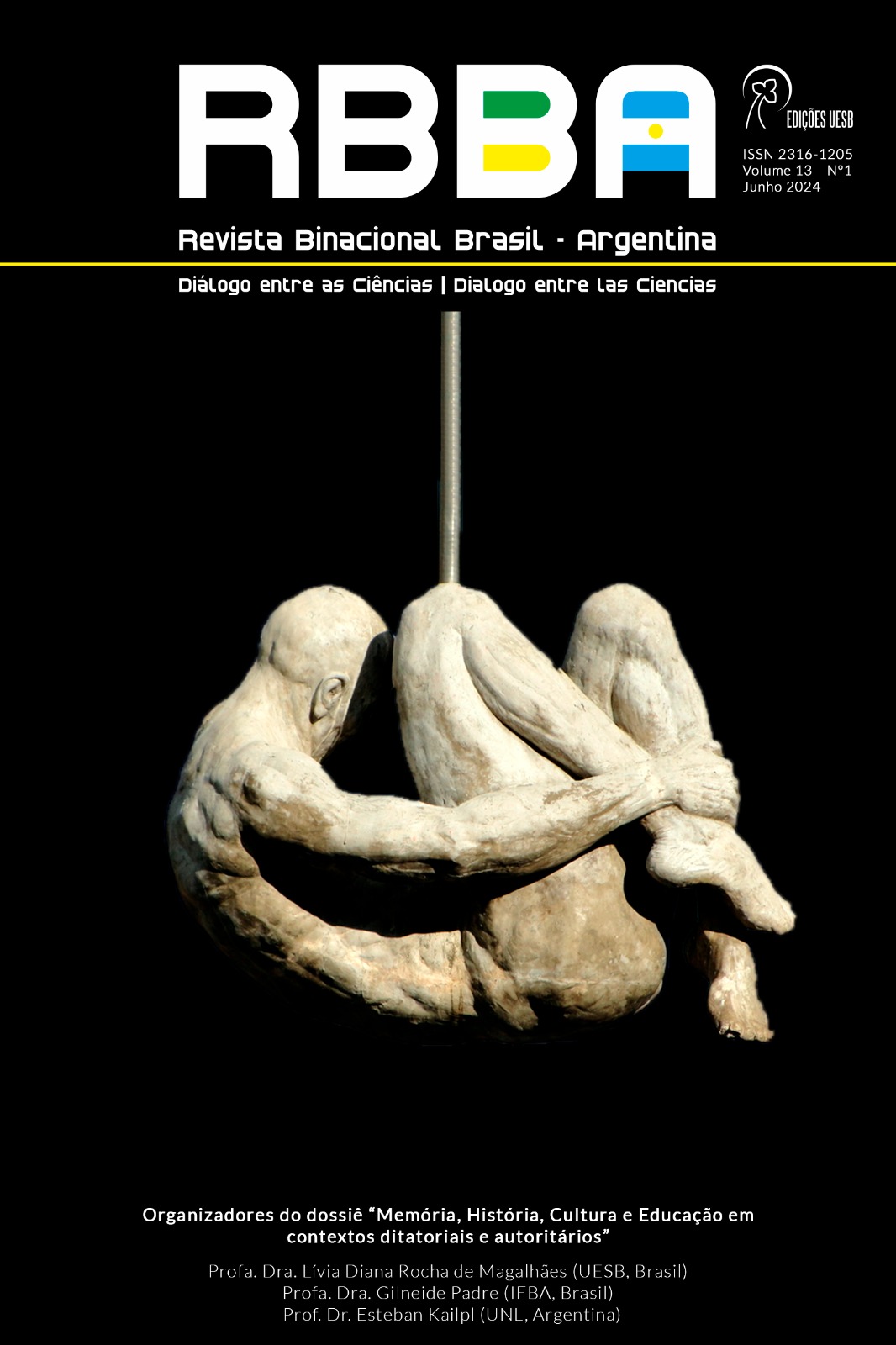A metacognição na construção do conhecimento profissional docente durante a formação inicial docente: o modelo “casa do caracol”
DOI:
https://doi.org/10.22481/rbba.v13i01.14541Palavras-chave:
Educação, Conhecimento, Formação de Professores, Cognição, ModeloResumo
A construção e o desenvolvimento do Conhecimento Profissional Docente requerem estratégias de aprendizagem autónomas baseadas nas mudanças permanentes e vertiginosas da sociedade atual. Com base nisso, é necessário que os professores reconheçam e apliquem a reflexão e a metacognição como competências transversais que entram em jogo no processo de formação contínua, a fim de aperfeiçoar, atualizar e desenvolver seus conhecimentos profissionais docentes. No presente trabalho apresentamos um modelo analógico para o desenvolvimento do Conhecimento Profissional Docente, a “casa do caracol”, que propõe as competências metacognitivas como motor central deste processo.
Downloads
Referências
ASKELL-WILLIAMS, H.; LAWSON, M. J.; SKRZYPIEC, G. Scaffolding cognitive and metacognitive strategy instruction in regular class lessons. Instructional Science, v. 40, n. 2, p. 413-443, 2012.
ÁVALOS, B. Los conocimientos y las competencias que subyacen a la tarea docente. En Vélaz de Medrano, C.; Vaillant, D. (Coords.). Aprendizaje y desarrollo profesional docente España: OEI-Fundación Santillana, 2009, p. 67-78.
BELLONO, A. Abordaje teórico de la metacognición. 2018. 97 f. Tesis (Licenciatura en Ciencias de la Educación de Buenos Aires) - Universidad de San Andrés. Escuela de Educación. Repositorio Institucional UN. Disponible en: https://repositorio.udesa.edu.ar/jspui/bitstream/10908/16653/1/%5bP%5d%5bW%5d%20T.L.%20Edu%20Bellomo,%20Ana.pdf
BRUCCINI, R. Reflexiones sobre la formación en la práctica profesional: proximidades teóricas, curriculares y normativas y conclusiones de un proceso de investigación. Encuentro Educativo. Revista de investigación del Instituto de Ciencias de la Educación, v. 2, n. 2, p. 127-153, 2021.
CHATZISTAMATIOU, M.; DERMITZAKI, I.; BAGIATIS, V. Self-regulatory teaching in mathematics: Relations to teachers' motivation, affect and professional commitment. European Journal of Psychology of Education, v. 29, n. 2, p. 295-310, 2014.
DARLING-HAMMOND, L.; BRANSFORD, J. Preparing teachers for a changing world. What teachers should learn and be able to do. San Francisco: Jossey-Bass, 2005.
DIGNATH, C.; BÜTTNER, G. Insights into teachers’ promotion of SRL in primary and secondary mathematics classrooms. Paper presented at the biannual conference of the European Association for Research on Learning and Instruction, Tampere, 30/08/17, 2017.
DE SMUL, M.; VAN KEER, H.; HEIRWEG, S.; DEVOS, G. Exploring diversity in teachers’ implementation of self-regulated learning in primary schools: A mixed-method study. In: Biennial meeting of the European Association for Research on Learning and Instruction (EARLI), Tampere (Finland), August 2017.
ERAUT, M. Developing Professional Knowledge and Competence. Psychology Press, 1994.
GLOGGER, I.; SCHWONKE, R.; HOLZAPFEL, L.; NUCKLES, M.; RENKL, A. Learning Strategies Assessed by Journal Writing: Prediction of Learning Outcomes by Quantity, Quality, and Combinations of Learning Strategies. Journal of Educational Psychology, v. 104, n. 2, p. 452-468, 2012.
GODOY, L. A. Sobre la estructura de las analogías en ciencias. Interciencia, v. 27, n. 8, p. 422-429, 2002.
KRAMARSKI, B.; MICHALSKY, T. Investigating Preservice Teachers' Professional Growth in Self-Regulated Learning Environments. Journal of Educational Psychology, v. 101, n. 1, p. 161-175, 2009.
KRAMARSKI, B.; REVACH, T. The challenge of self-regulated learning in mathematics teachers' professional training. Educational Studies in Mathematics, v. 72, n. 3, p. 379-399, 2009.
KENNEDY, M. Knowledge and teaching. Teachers and Teaching: Theory and Practice, v. 8, n. 3, p. 355-370, 2002.
MATEOS, M. Metacognición y Educación. Buenos Aires: Aique Grupo Editor S.A., 2001.
MARÍN DÍAZ, V. Las creencias formativas de los docentes universitarios. Revista Iberoamericana de Educación, v. 34, n. 5, 2005.
MÉNDEZ, E. M.; QUEVEDO, Y. J. A.; FERNÁNDEZ, M. D. Conocimiento profesional docente en ciencias naturales: tendencias teóricas. Areté: Revista Digital del Doctorado en Educación de la Universidad Central de Venezuela, v. 5, n. 10, p. 93-117, 2019.
MONTEIRO, AGUADED LANDERO, CARRILLO YAÑEZ. Guiones de acción de un profesor novel de ciencias a partir de la modelización de la enseñanza. Enseñanza de las ciencias. Revista de investigación y experiencias didácticas, v. 27, n. 1, p. 77-88, 2009.
MONTERO, L. La construcción del conocimiento profesional docente. Homo Sapiens, 2001.
PEÑALOSA CASTRO, LANDA DURAN, VEGA VALERO. Aprendizaje Autorregulado: una revisión conceptual. Revista electrónica de Psicología Iztacala, v. 9, n. 2, 2006.
PERRENOUD, P. Desarrollar la práctica reflexiva en el oficio de enseñar. Barcelona: Graó, 2006.
PORLÁN, R.; RIVERO, A. El conocimiento de los profesores. Una propuesta formativa en el área de ciencias. Sevilla: Díada, 1998.
POZO, J. I. Psicología del aprendizaje universitario. Ediciones Morata, 2009.
QUIROGA, M. La metacognición como función ejecutiva: su rol en la comprensión de textos. Exlibris, n. 5, p. 516-528, 2016.
REBER, R.; GREIFENEDER, R. Processing fluency in education: How metacognitive feelings shape learning, belief formation, and affect. Educational Psychologist, v. 52, n. 2, p. 84–103, 2017.
SANJURJO, L. Los dispositivos para la formación en las prácticas profesionales. Rosario: Homo Sapiens, 2009. 286 p.
SOODLA, P.; JOGI, A. L.; KIKAS, E. Relationships between teachers' metacognitive knowledge and students' metacognitive knowledge and reading achievement. European Journal of Psychology of Education, v. 32, n. 2, p. 201-218, 2017.
TARDIFF, M. Los saberes del docente y su desarrollo profesional. Madrid: Narcea, 2004.
VAN DRIEL, J. H.; BEIJAARD, D.; VERLOOP, N. Professional development and reform in science education: The role of teachers’ practical knowledge. Journal of Research in Science Teaching, v. 38, p. 137-158, 2001.
Downloads
Publicado
Como Citar
Edição
Seção
Licença
Copyright (c) 2024 Revista Binacional Brasil-Argentina: Diálogo entre as ciências

Este trabalho está licenciado sob uma licença Creative Commons Attribution 4.0 International License.






